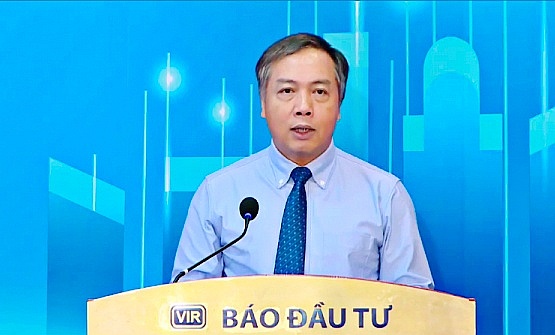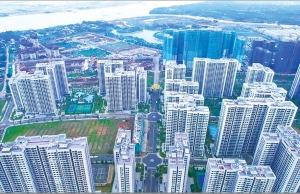Proposed land law amendments seek to spur Vietnam tourism
 |
| Le Trong Minh, VIR's editor-in-chief |
Speaking at VIR’s seminar with the theme, "Revising the Land Law: Creating Land Funds for Tourism” on October 19 in Hanoi, prominent legal expert Nguyen Hong Chung, chairman of the Board of Directors of DVL Ventures cum deputy head of the Hanoi Real Estate Club, suggested significant revisions to Vietnam's Land Law. These amendments are intended to establish a available land dedicated to the development of the tourism sector.
Chung's proposal centres around modifying Article 62 of the Land Law of 2013, which pertains to land requisition by the state for the purpose of national interest and public welfare.
According to Chung, projects subject to land requisition by the state are defined as those aimed at upgrading technical and social infrastructure for the general population's wellbeing. Notably, this does not currently encompass projects intended for tourism, recreational, or entertainment purposes, or those combining commercial residential development with tourism, service facilities, and entertainment venues.
The current draft of the amended Land Law does not include provisions for land requisition concerning new urban development projects. Therefore, it is essential to introduce the category of "New Urban Development Projects exceeding 300 hectares" into the list of real estate product types outlined in the amended Land Law. This is crucial for maintaining the consistency of the technical and social infrastructure framework.
"To truly transform tourism into a spearhead economic sector, the amended Land Law needs to include specific provisions for tourism land. Additionally, there should be open and supportive policies and mechanisms regarding land, taxes, and investments to foster the growth of the tourism industry," Chung said.
Legal expert Nguyen Van Dinh argued that the current draft of the amended Land Law is conspicuously silent on the requisition of land for regular tourism, recreational, and entertainment projects. The draft law only addresses land requisition for mixed-use residential and commercial business projects if it aligns with provincial People's Council decisions based on local conditions.
Adding to the proposed amendments, Dinh said that land should be requisitioned for standalone tourism, recreational, and entertainment projects without residential functions in suitable locations.
“In contrast, at locations deemed appropriate for tourism, priority should be given to land requisition for significant tourism projects that stimulate regional socioeconomic development and may even have a spillover effect on surrounding areas,” Dinh said.
On a different note, Nguyen Anh Que, member of the Executive Committee of the Vietnam Real Estate Association cum chairman of G6 Corporation, suggested a balanced approach. In his view, the draft Land Law should not entirely exclude land requisition for tourism projects from the legal framework, but should also avoid vague language.
“The draft law should be contingent on the total investment amount, project scale, and should subsequently determine investor selection methods and land requisition procedures based on these factors,” Que said.
These proposed amendments to the Land Law reflect an evolving understanding of the significance of tourism in Vietnam's economic landscape. By refining the legal framework, these changes seek to foster the growth of the tourism industry and create a conducive environment for investment in infrastructure and facilities necessary for its development.
The alterations aim to strike a balance between national interest and the requirements of the burgeoning tourism sector, allowing for the optimisation of resources and opportunities.
 | Land law points further scrutinised Clarifications on land use rights and property ownership for overseas lenders have been offered to the government from the foreign business community. |
 | Office market in HCM City predicted to become vibrant The office market in Ho Chi Minh has become vibrant recently with the operation of two office buildings in Thu Thiem new urban area which provides an additional 85,000 sq.m of floor space. |
 | Urban office rents fall amid supply glut A glut of new supply is seeing the vacancy rate of offices for rent in Ho Chi Minh City at their highest in 12 years while rents are falling. |
What the stars mean:
★ Poor ★ ★ Promising ★★★ Good ★★★★ Very good ★★★★★ Exceptional
 Tag:
Tag:
Related Contents
Latest News
More News
- Fairmont opens first Vietnam property in Hanoi (February 04, 2026 | 16:09)
- Real estate investment trusts pivotal for long-term success (February 02, 2026 | 11:09)
- Dong Nai experiences shifting expectations and new industrial cycle (January 28, 2026 | 09:00)
- An Phat 5 Industrial Park targets ESG-driven investors in Hai Phong (January 26, 2026 | 08:30)
- Decree opens incentives for green urban development (January 24, 2026 | 11:18)
- Public investment is reshaping real estate’s role in Vietnam (January 21, 2026 | 10:04)
- Ho Chi Minh City seeks investor to revive Binh Quoi–Thanh Da project (January 19, 2026 | 11:58)
- Sun Group launches construction of Rach Chiec sports complex (January 16, 2026 | 16:17)
- CEO Group breaks ground on first industrial park in Haiphong Free Trade Zone (January 15, 2026 | 15:47)
- BRIGHTPARK Entertainment Complex opens in Ninh Binh (January 12, 2026 | 14:27)






















 Mobile Version
Mobile Version